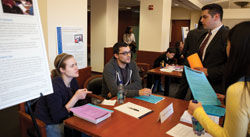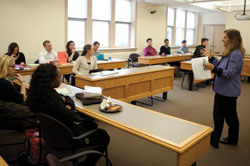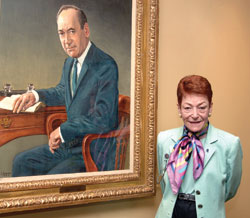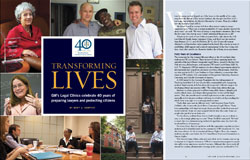Transforming Lives
GW's Legal Clinics celebrate 40 years of preparing lawyers and protecting citizens
When the young mother slipped out of the house in the middle of the night, away from the threats of her violent husband, she thought she'd lost it all—her home, her children, the life she'd known for 10 years. Then she walked into the Superior Court of D.C.
She found herself in a room with four other women trying to escape dangerous men. "There was a woman married for 25 years, another married for three years," she said. "We were all trying to stop abusive situations. But it was the first time I was ever in court. I didn't understand the process at all."
Thanks to the work of Law Professor Laurie Kohn, who directs the GW Law School's Family Justice Litigation Clinic, and third-year law students Amy Ramsey, JD '11, and Ali Fishbein, JD '11, the 32-year-old woman obtained a civil protection order against her husband. She is in the process of establishing child support and a custody arrangement for her four young children. And, after months in a homeless shelter, she is living in an apartment.
Forty Years of Excellence
The turnaround in that woman's life pays tribute to the 40-year legal clinic tradition at GW Law School. There are now 10 clinics operating under the umbrella of the Jacob Burns Community Legal Clinics, named for the late New York attorney, philanthropist, and longtime GW trustee Jacob Burns, LLB '24, LLD '70. Separately, GW law students also have clinical opportunities related to environmental law, animal law, and issues involving older prisoners. And they can take part in the D.C. Law Students in Court initiative, a consortium that teams up GW students with counterparts at Georgetown University, American University, and Catholic University of America.

Student attorneys from the clinics attend sessions each academic year to inform their peers about opportunities and impact.
A 2007 report by the Carnegie Foundation for the Advancement of Teaching found that U.S. law schools did a commendable job of preparing students' legal analysis skills but often did not provide "effective support for developing ethical and practice skills." The clinics help address that gap.
Students in clinics gain real-world lawyering skills, learn to identify and resolve ethical issues, and deepen their perspective on law and the legal system. They also provide much-needed legal services to the community, especially to low-income residents and those involved in civil proceedings for which there is no right to a court-appointed attorney.
"Each clinic gets cases in different ways," said Associate Dean Phyllis Goldfarb, who oversees the Jacob Burns Community Legal Clinics. "Some have partnerships with legal service pro bono providers in the local area and receive referrals. Some are cases assigned directly from the court. Some are people who just find us on their own.
"In the clinics, students learn how to think through a case, to evaluate a case, to do strategic planning in a case," Dean Goldfarb continued. "It's hard to teach that in a classroom using exclusively appellate cases, but that's the bread and butter of lawyering."
For every clinic, there is a professor with the appropriate expertise to direct students and an identified need in the community. GW's location in D.C. has also been a factor. At the International Human Rights Clinic, for example, students can take cases before the D.C.-based Inter-American Commission on Human Rights.
The Vaccine Injury Clinic—the only such clinic in the country—was set up in response to Congress' creation in 1988 of a compensation program for people who suffer severe injuries as a result of vaccines. Although the clients reside all around the country, administrative hearings in the cases are conducted in D.C.
Other clinical services range from immigration law to health rights law, domestic violence law, and public justice advocacy.
Students spend the first years of law school reading appellate cases where "the facts and the incidents are frozen in time," said Professor Kohn of the Family Justice Litigation Clinic. "In clinic they work with facts that are ever-changing and clients whose minds are ever-changing and whose memories are fallible."
Because clinic caseloads are smaller than those of legal aid lawyers, the students can often give more time and attention to their clients. Professor Kohn said that means students must also prepare emotionally for intimate interaction with people facing an array of challenges, including poverty.

Phyllis Goldfarb, Jacob Burns Foundation Professor of Clinical Law and associate dean for clinical affairs, addresses students about clinical opportunities.
In Anne Olesen's Federal, Criminal, and Appellate Clinic, a first case may also mark a student's first visit to a state prison. Those cases—appeals for people with serious criminal convictions in Maryland—are not screened for innocence or merit. "Instead, we just take random cases as a public defender would," Professor Olesen said. "The result is that my students get a realistic experience."
The success rate for Professor Olesen's students is also realistic: They win slightly more of their cases than the national average of 15 percent. Still these victories, while few in number, often have broad consequences.
For example, it was an appeal two years ago by students in one of Professor Olesen's clinics that led to a recent change in jury instruction rules in Maryland. In that case, Atkins v. State, the jury was told "there is no legal requirement that the state utilize any specific investigative technique or scientific test to prove its case." The instruction was designed to counter the "CSI effect," the erroneous perception by jurors—thanks to what they see on TV crime shows—that scientific evidence is both readily available and infallible. On appeal, it was found that the instruction was too broad, relieving the state of its burden to prove guilt beyond a reasonable doubt.
For Professor Olesen, the most gratifying part of the clinic is when "a student doesn't know what he or she wants to do after law school and finds his or her passion here. I now have several former students working as public defenders." In January, one of those former students argued a case before the U.S. Supreme Court. Professor Olesen and her students were there to listen.
Sometimes students from one clinic are called in to assist students from another. Not long ago, students in the Small Business & Community Economic Development Clinic worked with counterparts in the International Human Rights Clinic on an international trademark case. It involved a human rights campaign that used a well-known cartoon character in its messages.
Susan Jones directs the Small Business & Community Economic Development Clinic, which provides free start-up legal assistance to community micro-businesses and nonprofits. The clinic is part of a U.S. Patent and Trademark Office Law School Clinical Certification Pilot program that allows students to practice intellectual property law and file trademark applications. It is one of GW Law's oldest clinics—started in 1977—and also one of the oldest small business clinics in the country, started with seed money from the U.S. Small Business Administration.
GW's Newest Clinic
The clinic's nonprofit and for-profit clients have run the gamut from a food co-op to dance and theater companies, musicians, and visual artists. One client, a smoothie franchise at Dulles Airport, grew so large that it no longer qualified for the clinic's free assistance. Professor Jones calls that a "success story."
The youngest clinic, the Neighborhood Law and Policy Clinic directed by Professor Jessica Steinberg, launched in September with a focus on the poorest members of the community. It addresses housing, public benefits, and the civil legal needs of ex-offenders. In one of its first cases, third-year law students Iris Lowery and Athena Hemphill were assigned to help a D.C. man with his request for early termination of parole, something available to D.C. parolees only since 2010. Their client, who had been convicted on a drug distribution charge, left jail five years ago. Without early termination, he would remain on parole until 2028.
GW Law Board of Advisors member Dr. Rosalie Burns stands in front of the self-portrait of her father, Jacob Burns, LLB '24, Hon. LLD '70.
The clinic was a big jump from Ms. Lowery's goal when she entered law school: to practice maritime environmental law. During her first summer in law school she worked on environmental law issues for the Department of Justice. The following summer, she had an assignment in New Hampshire. She chose Professor Steinberg's clinic because she wanted to try something different.
Ms. Lowery and Ms. Hemphill immersed themselves in the hearing. They spoke frequently with their client, and their groundwork was intense. Officially, they lost the case. But that's not what it sounds like when you speak with Ms. Lowery or the parolee.
"We had our hearing and it wasn't successful, but I ended up in a position where I was conducting a direct exam," Ms. Lowery said. "And that's not something I've ever contemplated doing. I'm so much more used to—and comfortable with—writing and researching.
"It pushed me beyond what I thought I was capable of. I was a lawyer. And that's what clinic's all about," she said, adding that she doesn't know what she'll do when she graduates, but maritime environmental law is receding from the spotlight.
For the client, the interaction with the clinic had an even more profound result. He said the students called him frequently, often once or twice a week. They kept him updated. They plunged into the minutiae of his case. They documented in detail how he used to live and how he has lived since he was paroled.
"I'm 59 years old, and I've been in the criminal justice system since I was about 20. I've had plenty of attorneys in my lifetime," he said. "Most other attorneys might have looked at me like a criminal, they may have looked at me like a substance abuser, but Iris and Athena looked at me like a person, like a human being.
"That had never happened to me before. And it's made me look at myself a little differently."

